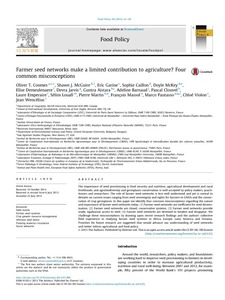Elsevier is a world-leading provider of information solutions that enhance the performance of science, health, and technology professionals.
All knowledge begins as uncommon—unrecognized, undervalued, and sometimes unaccepted. But with the right perspective, the uncommon can become the exceptional.
That’s why Elsevier is dedicated to making uncommon knowledge, common—through validation, integration, and connection. Between our carefully-curated information databases, smart social networks, intelligent search tools, and thousands of scholarly books and journals, we have a great responsibility and relentless passion for making information actionable.
Members:
Resources
Displaying 226 - 230 of 1605Current trends of rubber plantation expansion may threaten biodiversity and livelihoods
The first decade of the new millennium saw a boom in rubber prices. This led to rapid and widespread land conversion to monoculture rubber plantations in continental SE Asia, where natural rubber production has increased >50% since 2000. Here, we analyze the subsequent spread of rubber between 2005 and 2010 in combination with environmental data and reports on rubber plantation performance. We show that rubber has been planted into increasingly sub-optimal environments. Currently, 72% of plantation area is in environmentally marginal zones where reduced yields are likely.
Farmer seed networks make a limited contribution to agriculture? Four common misconceptions
The importance of seed provisioning in food security and nutrition, agricultural development and rural livelihoods, and agrobiodiversity and germplasm conservation is well accepted by policy makers, practitioners and researchers. The role of farmer seed networks is less well understood and yet is central to debates on current issues ranging from seed sovereignty and rights for farmers to GMOs and the conservation of crop germplasm. In this paper we identify four common misconceptions regarding the nature and importance of farmer seed networks today.
Farmer seed networks make a limited contribution to agriculture? Four common misconceptions
The importance of seed provisioning in food security and nutrition, agricultural development and rural livelihoods, and agrobiodiversity and germplasm conservation is well accepted by policy makers, practitioners and researchers. The role of farmer seed networks is less well understood and yet is central to debates on current issues ranging from seed sovereignty and rights for farmers to GMOs and the conservation of crop germplasm. In this paper we identify four common misconceptions regarding the nature and importance of farmer seed networks today.
Farmer seed networks make a limited contribution to agriculture? Four common misconceptions
The importance of seed provisioning in food security and nutrition, agricultural development and rural livelihoods, and agrobiodiversity and germplasm conservation is well accepted by policy makers, practitioners and researchers. The role of farmer seed networks is less well understood and yet is central to debates on current issues ranging from seed sovereignty and rights for farmers to GMOs and the conservation of crop germplasm. In this paper we identify four common misconceptions regarding the nature and importance of farmer seed networks today.
Farmer seed networks make a limited contribution to agriculture? Four common misconceptions
The importance of seed provisioning in food security and nutrition, agricultural development and rural livelihoods, and agrobiodiversity and germplasm conservation is well accepted by policy makers, practitioners and researchers. The role of farmer seed networks is less well understood and yet is central to debates on current issues ranging from seed sovereignty and rights for farmers to GMOs and the conservation of crop germplasm. In this paper we identify four common misconceptions regarding the nature and importance of farmer seed networks today.



